N/A
UCF Knights Football
Cincinnati, Houston, UCF and BYU to Join Big 12 in Summer of 2023
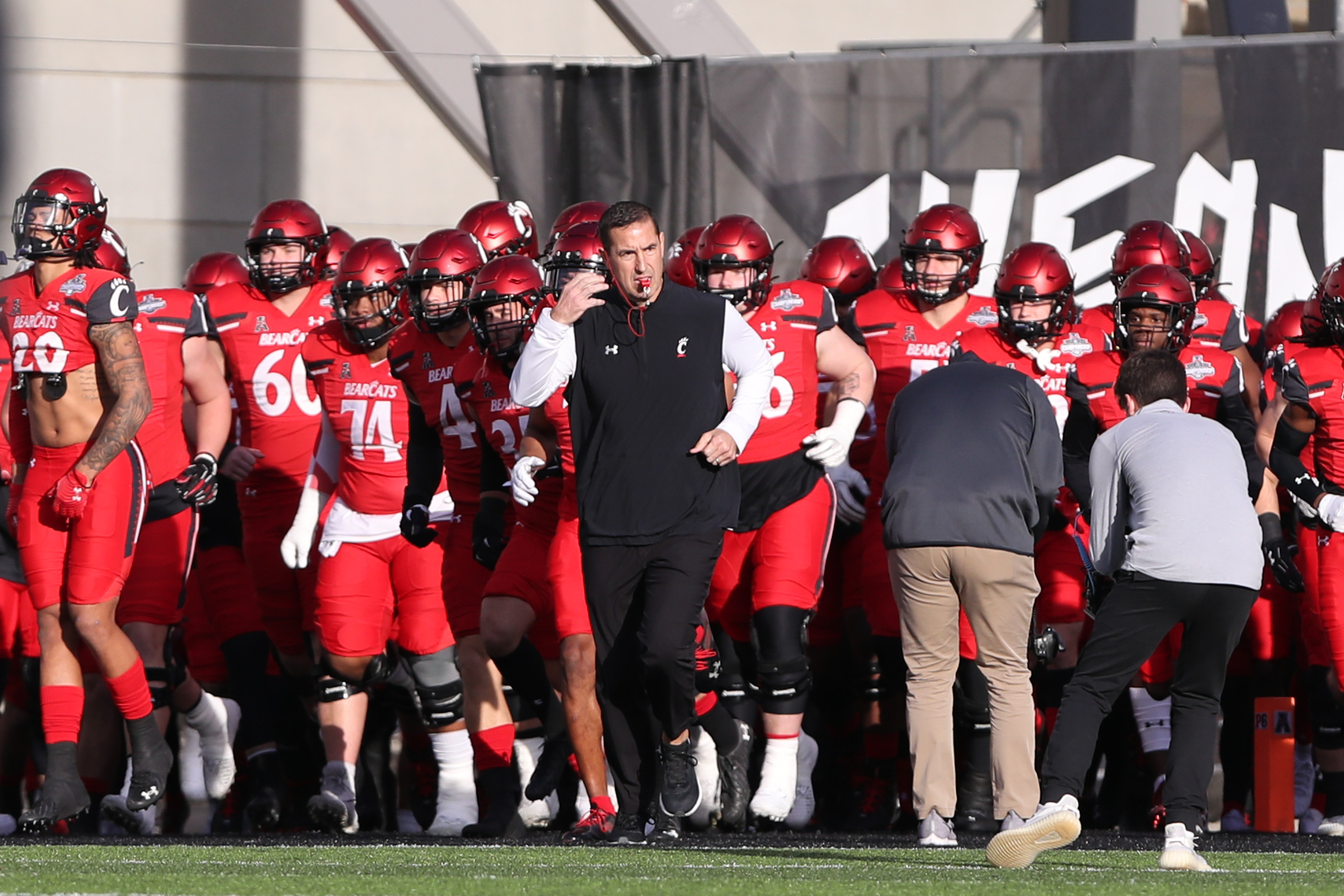
The Big 12 will add four new schools in the summer of 2023.
Central Florida, Cincinnati, Houston and BYU will officially join the conference next summer.
American Athletic Conference Commissioner Mike Aresco announced Friday the AAC has reached early-exit agreements with UCF, Cincinnati and Houston that will take effect July 1, 2023, and allow them to move to the Big 12.
The Big 12 announced in September that all four schools would join the conference "no later than the 2024-25 athletic year."
Per ESPN's Heather Dinich, AAC bylaws require schools to give a 27-month notice before they leave in addition to paying a $10 million buyout fee. The earliest exit date for the schools if they abided by those rules would have been July 1, 2024.
Aresco told Dinich the AAC was willing to negotiate a higher exit fee that would allow UCF, Cincinnati and Houston to leave early:
"We typically do, because it's not a great situation when you know somebody's leaving. Often you can mitigate some of that by just again getting a larger exit fee and having them leave earlier so we'll certainly be willing to negotiate that as we've done in the past and as other conferences have done in the past, but I can't tell you precisely yet at this point, nobody's indicated what year."
Per Brett McMurphy of the Action Network, the three schools are paying $18 million apiece to leave early after the AAC initially sought $45 million.
All of these moves come after Texas and Oklahoma accepted invitations in July to join the SEC from the Big 12.
Per Brian Davis of the Austin American-Statesman, the 2024-25 athletic year is "still a more realistic target date" for the Longhorns and Sooners to leave.
If that ends up being the case, the Big 12 will have 14 members for the 2023-24 athletic year.
Report: Cincinnati, Houston, UCF Negotiating $17-20M Settlement to Join Big 12 in '23
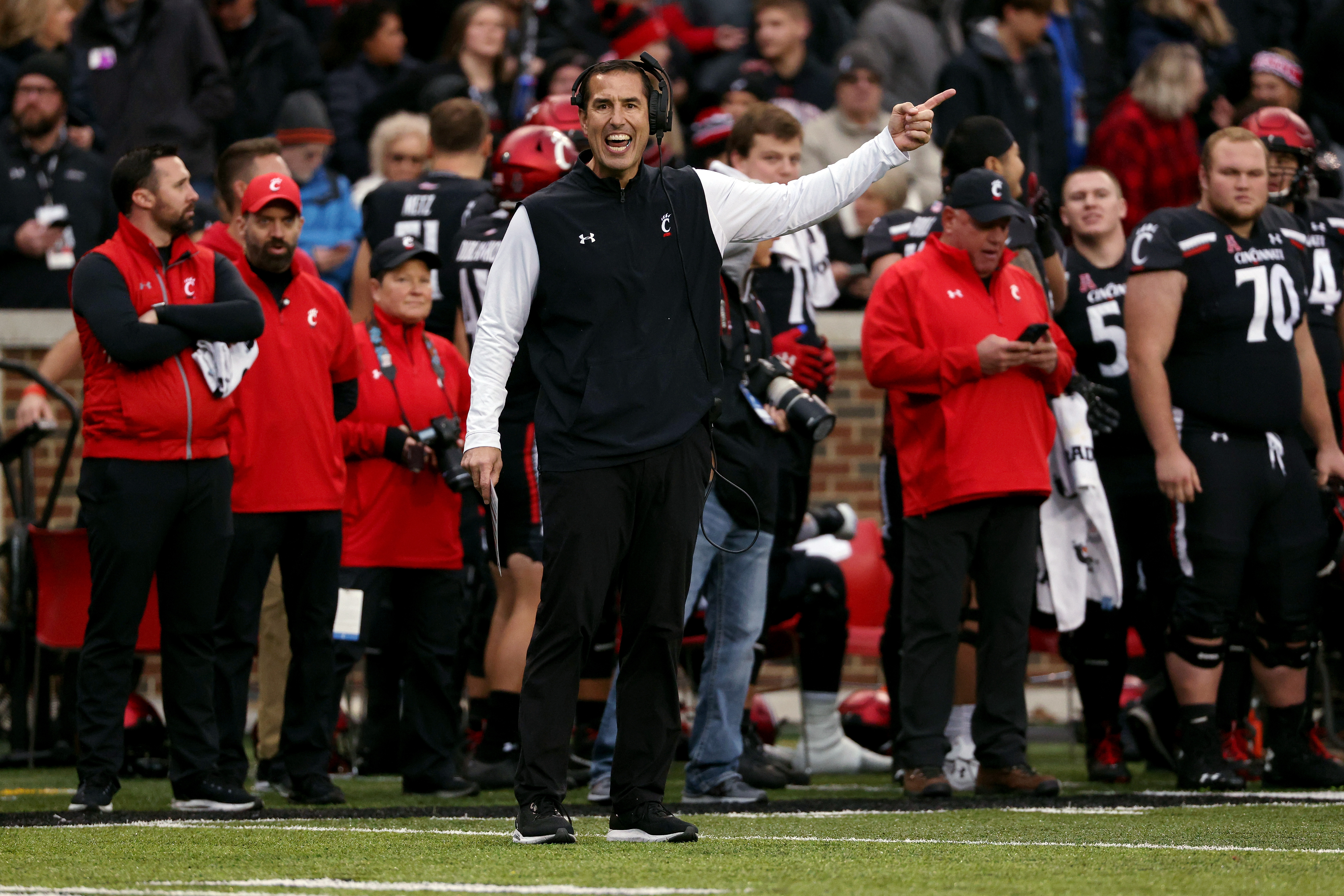
Cincinnati, Houston and UCF are reportedly in talks with the American Athletic Conference about a settlement that would allow them to leave for the Big 12 in 2023 instead of 2024.
Brett McMurphy of the Action Network reported Tuesday the schools are discussing an agreement worth in the "$17 million to $20 million range" after AAC Commissioner Mike Aresco sought a $35 million early-exit fee.
Sources told McMurphy the three programs are "fully confident" a deal will be finalized this month.
A whirlwind of movement started last July when Oklahoma and Texas accepted offers to join the SEC no later than 2025, which jump-started a battle between the conferences to remain viable once the dust settled from the realignment.
Losing OU and UT, its two most valuable programs, led the Big 12 to seek an expansion to 14 teams that it will achieve with the addition of the three AAC schools and BYU, which will give up its independent status in football.
Now, with most of the conference changes having been agreed to, schools are beginning to seek early departures to avoid the multiyear wait times before the switch.
A fee of up to $20 million is no small thing. In November, Russ Heltman of Sports Illustrated noted Cincinnati spent $74 million on athletics during the 2020-21 school year. So, all other things being equal, adding the settlement on top would represent a 27 percent increase in spending.
The television deal is the equalizer, though. Cincinnati will go from $6 million per year from that revenue stream to $26 million annually following the Big 12 move, per Heltman.
In other words, the early-exit fee could pay for itself in year one and then turn into pure profit from that point forward.
Meanwhile, the timing of the AAC departures is going to have an impact on other changes.
There are six Conference USA programs waiting to join the AAC—Charlotte, Florida Atlantic, North Texas, Rice, UAB and UT San Antonio—and three other C-USA teams heading to the Sun Belt—Marshall, Old Dominion and Southern Miss.
In turn, C-USA has added Jacksonville State, Liberty, New Mexico State and Sam Houston State with discussions to also bring in Eastern Kentucky and Tarleton State, though the latter discussions have been tabled for now, per McMurphy.
So, while the wheeling and dealing continues, college sports fans can expect a lot of new rivalries no later than 2025 and possibly as soon as 2023.
Former UCF RB Otis Anderson Jr. Killed in Shooting at Age 23
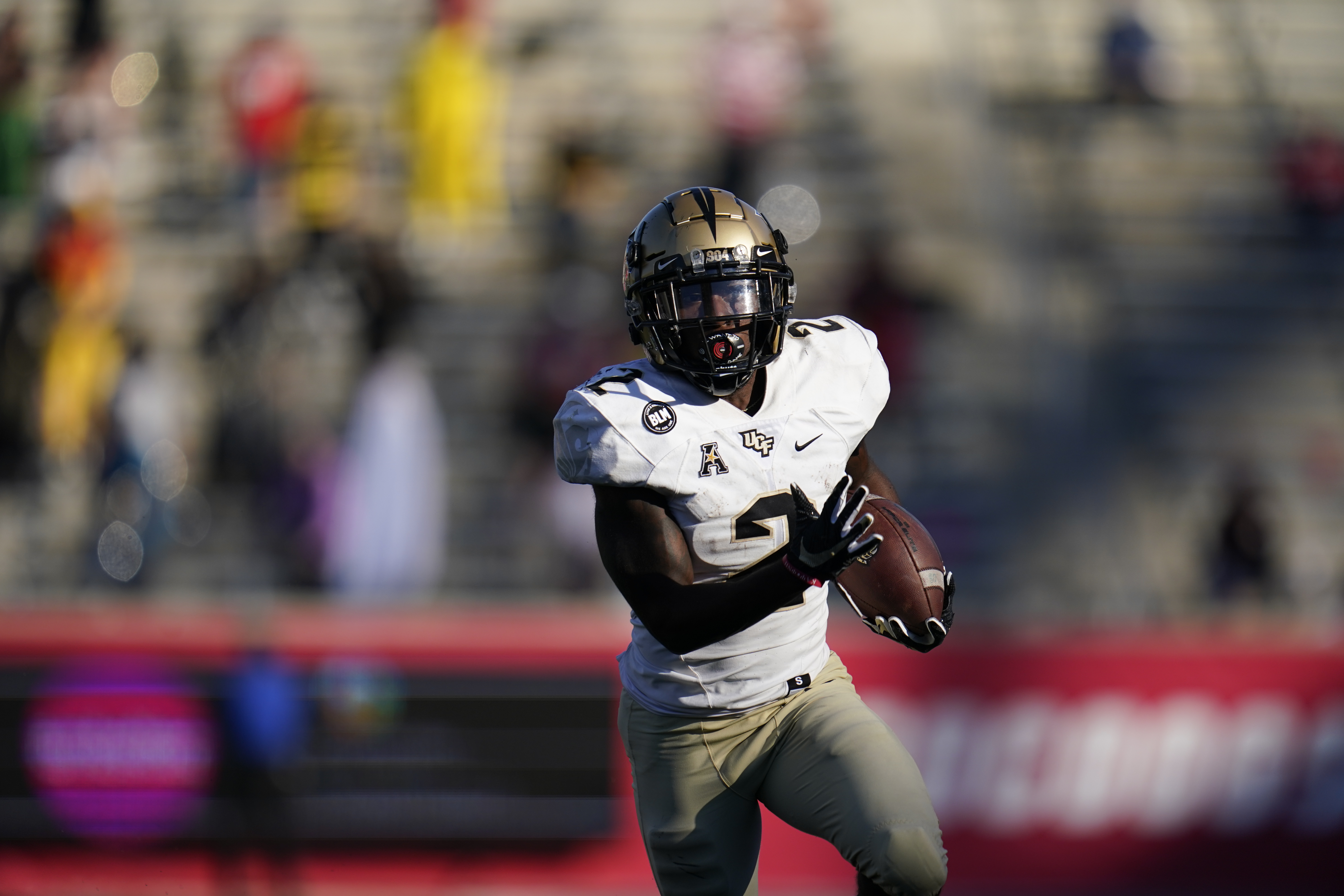
Former UCF running back Otis Anderson Jr. was killed in a shooting Monday night in Jacksonville, Florida.
He was 23 years old.
"Our deepest condolences go out to everyone who loved Otis," UCF's announcement read. "He was taken too soon and will truly be missed."
Jason Beede of the Orlando Sentinel reported police documents confirmed Anderson died Monday after the shooting.
Casey Feindt of First Coast News in Jacksonville reported his father, Otis Lee Anderson, was charged with one count of first-degree murder and one count of first-degree attempted murder and is being held without bond after he was booked into the Duval County jail.
Anderson Jr. played collegiately at UCF from 2017 through 2020 and was part of the team that went a perfect 13-0 during the 2017 campaign. The Knights used him as a running back, pass-catcher and punt returner, and he finished his collegiate career with 27 total touchdowns, one of which came on a punt return.
He signed with the Los Angeles Rams as an undrafted rookie but was waived in September.
Some of his former Rams teammates, including Jalen Ramsey and Sebastian Joseph-Day, offered their support on Twitter:
Rams director of football affairs Jacques McClendon also shared a message on Twitter that read, "We lost an incredible human in Otis Anderson. Never had a bad day and always brought contagious energy! Life is precious, so make the days count and don't just count the days."
UCF's Dillon Gabriel Out Indefinitely; Shoulder Injury Diagnosed as Clavicle Fracture
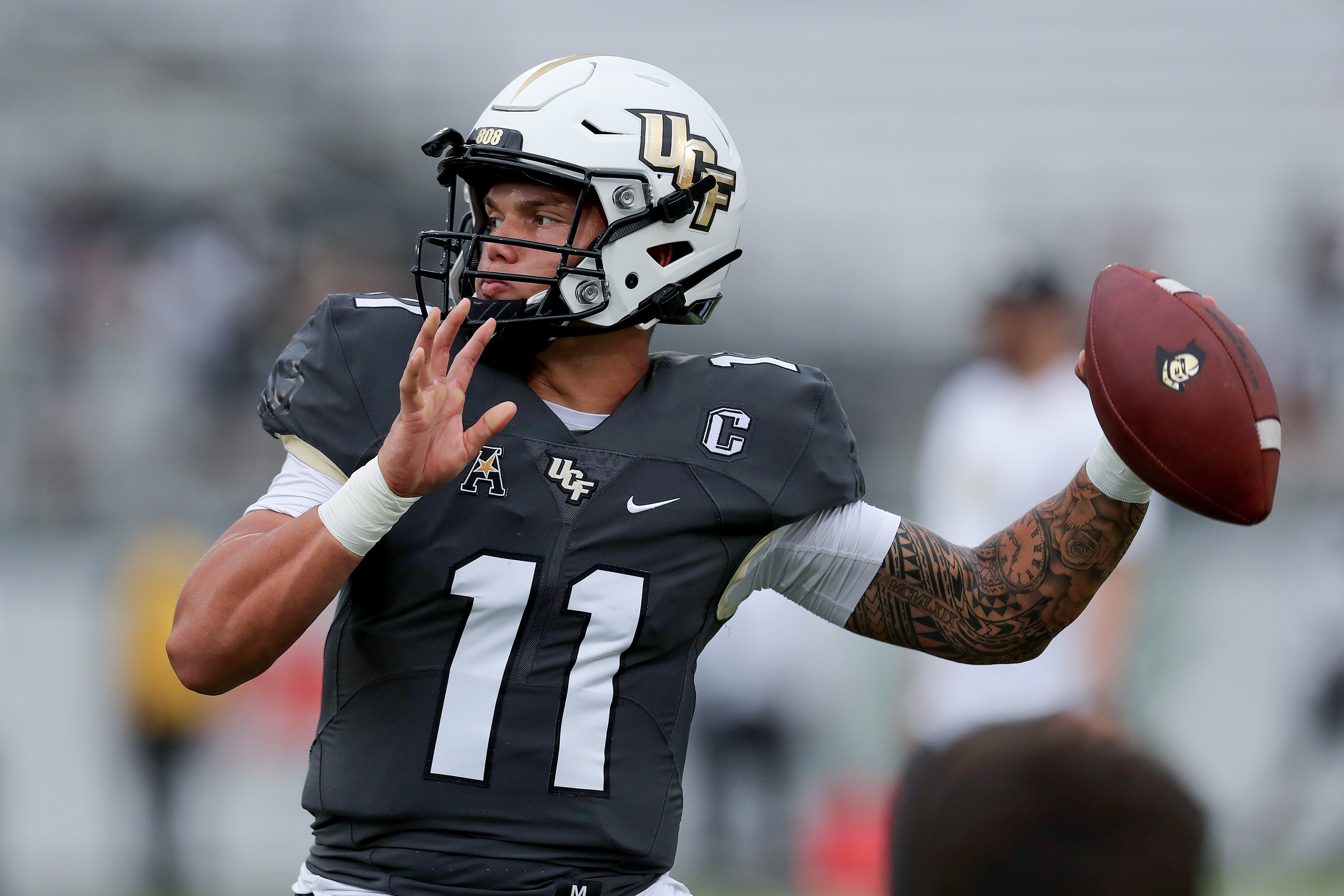
UCF announced Saturday that quarterback Dillon Gabriel will be out indefinitely after he suffered a fractured left clavicle late in Friday night's road loss to Louisville.
Gabriel posted a statement Saturday on Instagram:
The Hawai'i native put together a terrific 2020 season for the Knights. He ranked fourth in the Football Bowl Subdivision in passing touchdowns (32) and fifth in passing yards (3,570) while leading the team to a 6-4 record and an appearance in the Boca Raton Bowl, in which it lost to BYU.
Gabriel has accounted for 79 touchdowns (70 passing, eight rushing and one receiving) across 26 games in two-plus seasons. He's tallied just 14 interceptions over that span.
The Knights were off to a 2-0 start with wins over Boise State and Bethune-Cookman before their 42-35 loss to Louisville. Jaylin Alderman returned an interception 66 yards for a touchdown with 13 seconds left to give the Cardinals the win.
Gabriel was injured on a Hail Mary attempt after UCF got the ball back.
"He's a great competitor, great player and competed to the last play," Knights head coach Gus Malzahn told reporters after the game.
Mikey Keene, who threw a touchdown pass in seven attempts in relief of Gabriel during a blowout of Bethune-Cookman, should get the first crack to fill the massive void. Quadry Jones is another option for Malzahn.
UCF has a bye next week before it returns to action Oct. 2 for a road game against Navy.
Report: UCF, BYU, Cincinnati, Houston Plan to Submit Applications to Join Big 12
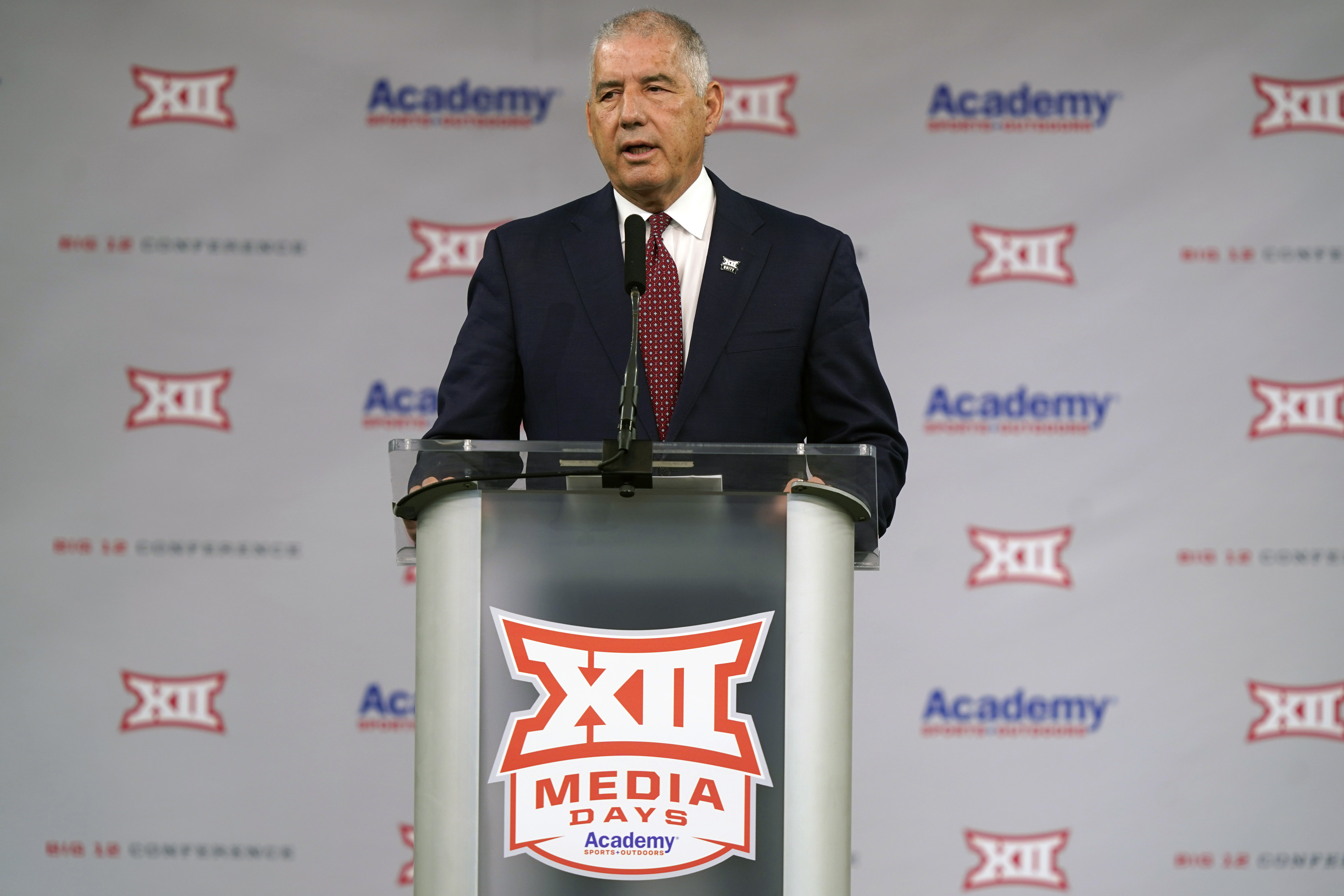
UCF, BYU, Cincinnati and Houston are all planning to submit applications to join the Big 12, which is looking to regroup after news emerged that Oklahoma and Texas plan to join the SEC.
Sports Illustrated's Pat Forde and Ross Dellenger broke the news Friday, and ESPN's Adam Rittenberg and Heather Dinich confirmed it as well.
Sports Illustrated reported that the applications are expected to be in next week, and approval could happen as soon as Sept. 10, when the Big 12 presidents are scheduled to meet.
As for how the league structure might work, SI wrote the following:
In this scenario, the four teams will join the league by 2023 or, at the very latest, 2024, and may even compete alongside Oklahoma and Texas before those two powerhouses depart for the SEC, making for a couple of awkward seasons in a 14-team Big 12.
The timeline is fluid and has been described as optimistic, but not unrealistic. Big 12 commissioner Bob Bowlsby has even gone on site visits, most recently taking a trip to meet with Houston officials on Thursday.
ESPN also noted that the potential expansion is moving very quickly.
"Things are moving very quickly," a source told ESPN Friday. "There's obvious momentum to get votes to the board."
The ESPN duo previously reported Thursday that the four aforementioned schools had informally contacted the Big 12 about joining.
The Big 12 has found itself in a bind after news emerged of Oklahoma and Texas' impending departures, but the conference was also left out of the newly formed alliance between the Pac-12, Big Ten and ACC.
The SEC will clearly stand alone as the most powerful conference in college sports bar none when Oklahoma and Texas join, although the league has to contend with the alliance, which was formed in response to the SEC's power move.
That left the Big 12 as the lone Power Five conference that hadn't increased its power in some way. The natural move was to add schools, which appears to be moving at warp speed to keep up with the rest of the college sports landscape.
As for when those schools will join, American Athletic Conference members UCF, Houston and Cincinnati's most "realistic timeline" is 2024, per ESPN.
American Athletic Conference bylaws require schools to give a 27-month notice before they leave and pay a $10 million buyout fee. In that scenario, joining by the 2023 season would be a long shot, but an earlier exit and higher buyout could be negotiated. The most realistic timeline, sources said, is 2024.
Sources told ESPN that those three schools have not told the AAC of their intentions.
BYU is an FBS independent but participates in the West Coast Conference for other sports. SI noted that the school must give the league advance notice if its intends to leave.
Gus Malzahn Lands the Rare Mix of High Expectations and Realistic Upside at UCF

Gus Malzahn has secured one of the best jobs in college football.
Now at UCF, the former Auburn boss assumes control of a program that has fielded teams ranging from respectable to highly competitive for the last decade-plus.
Since 2007, the Knights have won six conference titles. Four years removed from a mythical national championship and three from a second straight undefeated regular season, UCF has also posted a 16-7 record during the last two years. The recent success has created real expectations within the fanbase.
UCF is among the premier programs in the AAC, a league that campaigns for "Power Six" recognition. Plus, if there's ever another wave of realignment, UCF will garner legitimate interest.
Along with its location in the recruiting hotbed of Florida, that's in no small part because of the school's spending on facilities and coaches. Last year, per USA Today, then-head coach Josh Heupel earned $2.3 million—one spot behind Wake Forest's Dave Clawson and one ahead of Oregon State's Jonathan Smith. Malzahn, too, will earn $2.3 million annually.
In short, Malzahn has a readymade winner with supporters who expect success. The best-case scenario is a promotion to power-conference affiliation, and the worst-case scenario is being a well-supported big fish in the Group of Five pond.
Yet, in theory, UCF has brushed its ceiling.
Neither the Knights' prior undefeated years nor Cincinnati's 9-0 record in 2020 cracked the College Football Playoff barrier. Given that reality, no reasonable person can label a national title a justifiable goal for Malzahn.
At the same time, however, the program is close enough to national contention that it can throw a fit and be heard loudly. The fans expect an opportunity to make the noise, too—and will be heard clearly if UCF doesn't win.
"Do you have a good grasp of the pressure cooker you're walking into here?" a reporter asked Malzahn at his press conference.
Well, yes. Malzahn spent eight years at Auburn, a school with two SEC championships, one national title and national runner-up during the 2010s. He was the offensive coordinator or head coach in those years; he understands this level of pressure.
The point of the question is fair, though. UCF expects more than a nice season once in a while. This blend of recent success, fan support and financial contributions is rare in the Group of Five.
While power-conference teams generally have that outlook, it's difficult to sustain. Alabama, Clemson, Ohio State and Oklahoma have remained at the top of their conferences for an extended period, but others have occasionally broken through and quickly dipped. They surge, then fall again. Malzahn's time at Auburn is a good example of that challenge.
In Orlando, though, Malzahn has a far greater opportunity to accomplish it. Though he's one of few coaches to defeat Nick Saban in the SEC, the whole "not playing Alabama every year" thing is a plus.
Malzahn has everything you'd want in a coaching job: established success, financial backing and a great location for recruiting.
But the sky won't fall if a national title doesn't come. Instead, that's a happy bonus to baseline goals of a few conference championships and prominent bowl games.
All recruiting information via 247Sports. Stats from NCAA.com, cfbstats.com or B/R research. Follow Bleacher Report CFB Writer David Kenyon on Twitter @Kenyon19_BR.
Gus Malzahn Named UCF Head Coach After 8 Seasons with Auburn

UCF announced Monday that former Auburn coach Gus Malzahn will be the team's new head football coach.
Malzahn said in a statement:
"I'm thrilled to be the head coach at UCF, and I'm truly looking forward to being part of Knight Nation. It's exciting to be head of a program where the future is extremely bright. I will be hitting the ground running in terms of getting to know our team and everyone else connected with UCF. Our goal is to be ready to win championships."
Athletic director Terry Mohajir added:
"When I started the search process, it became very evident very quickly that, based on the conversations I had with the players last week and what they told me were looking for, Gus Malzahn was the guy for the job. He has won at every level, and he has coached a Heisman Trophy winner and NFL draft picks. There has never been a better time for Coach Malzahn to lead this program than right now."
Malzahn signed a five-year contract worth $11.5 million, per the school.
Malzahn spent the past eight years with Auburn, accumulating a 68-35 record while finishing over .500 in each season. The school fired him in December after the Tigers produced a 6-4 mark in 2020. The head coach was also paid a $21.45 million buyout as part of his exit from Auburn.
Despite his consistency during the regular season, the 55-year-old was often criticized for his team's performances in the postseason.
The Tigers went 2-5 in bowl games with Malzahn at the helm, including losses in the BCS National Championship, Sugar Bowl and Peach Bowl, the latter coming against UCF after the 2017 season.
"After evaluating the state of the Auburn football program, we've decided that it was time to make a change in leadership," Auburn director of athletics Allen Greene said in a statement in December.
Auburn hired former Boise State head coach Bryan Harsin to replace Malzahn.
Malzahn has an opportunity at a fresh start with UCF, which had a vacancy after head coach Josh Heupel left for Tennessee.
The Knights went 6-4 in 2020 but have been one of the most successful teams in college football as of late with a 41-8 record over the last four seasons.
Adding Malzahn gives the school an experienced coach who won the AP Coach of the Year award in 2013 during his first season at Auburn. As an offensive coordinator with the Tigers, he won the Broyles Award as the top assistant coach in the country while helping lead the team to a national championship.
The coach also had success at lower levels with a 9-3 record during his lone season at Arkansas State in 2012.
Mohajir was the athletic director at Arkansas State at the time and was recently hired as the AD of UCF.
Multiple UCF Football Players Dismissed from Team After Antwan Collier's Arrest

Defensive back Antwan Collier, defensive linemen Kenny Turnier and Randy Charlton and linebacker Eric Mitchell have been dismissed from the UCF football program, per Jason Beede of Knights247.
UCF head coach Josh Heupel announced that multiple players had been dismissed from the Knights but did not mention any names in a statement, per Beede: "As of today, there are some young men who are no longer part of our football program. Our team discipline is handled internally, so I am not going to mention specific names. We will ensure these individuals have ongoing access to academic and health services as we continue to support them in those areas."
The dismissals reportedly stem from Collier's arrest on the UCF campus early in the morning of Oct. 29 and subsequent charges for carrying a concealed firearm and driving with a suspended/revoked license, per Orange County Clerk of Court public records (h/t Beede). He was originally pulled over for "driving carelessly," per the arrest affidavit.
He was booked into the Orange County jail just before 5 a.m. ET last Thursday.
According to the police report, defensive backs Aaron Robinson and Brandon Moore were in the car with Collier, and Mitchell was as well. A second car with other football players (including linebacker Jeremiah Jean-Baptiste) was also on the scene.
Beede relayed information from the police report:
"'After Collier got arrested, his friends and other occupants of the other vehicle got upset and began yelling profanity towards Ofc. Wilk,' the police report states. According to the police report, the following profanities were just part of what was yelled at the officers: 'Dumb as hell,' 'Eat a f--king donut,' 'He plays football for ya'll, f--k,' 'This is dumb ass s--t.' KnightNews.com obtained UCFPD officers' body-worn camera footage from the events during the traffic stop and Collier's arrest. The footage can be seen here."
The quartet did not travel for the team's 44-21 win at Houston last Saturday.
Charlton and Turnier both provided comments on Wednesday following their reported dismissals:
The losses are significant for the Knights, who have started their season 4-2.
Collier had a team-high four pass breakups along with 22 tackles, a forced fumble and a fumble recovery. Charlton had 18 tackles, two sacks and two pass breakups.
Turnier posted a team-high four sacks in addition to 12 tackles and a forced fumble. Mitchell was second on the team with 40 tackles.
UCF has three more regular-season games at home against Temple and No. 6 Cincinnati before visiting South Florida.
UCF Announces 3 Football Players Tested Positive for Coronavirus

UCF announced Tuesday that three football players have tested positive for the coronavirus:
The NCAA allowed players to return to campus June 1 after months away because of the ongoing pandemic, and UCF opened the doors for athletes right away. A reported 60 players were in attendance for voluntary workouts and each was tested, resulting in three positives.
The three players will be placed in isolation for two weeks, while those in direct contact with the players over the last two weeks have been notified.
Knights quarterback McKenzie Milton reportedly had a health scare in May when he had a slight fever and his throat hurt, but his COVID-19 test came back negative, according to Andrea Adelson and Heather Dinich of ESPN.
"It was terrible," he said of the test process, "but better safe than sorry."
The school announced last month all players would be tested as part of a reorientation week. There are other safety measures in place, including masks for support staff and additional cleaning of facilities.
UCF vice president and athletics director Danny White provided an update on the process:
"Certainly health and safety are our number-one priorities and are at the core of every element involved as we take the first step forward in terms of a return to college athletics, while at the same time being ever mindful of the challenges posed by COVID-19.
"Our staff has been consulting regularly with national health experts, as well as colleagues within our league (American Athletic Conference) and locally with Orlando Health. We are committed to keeping student-athletes, staff, coaches, campus and the community as safe as possible amid the pandemic. We expect flexibility to be required as we navigate multiple new sets of circumstances."
With multiple players testing positive, the program must be extra vigilant to keep everyone safe.
